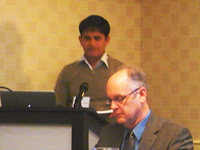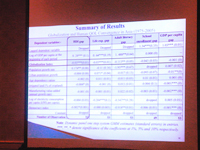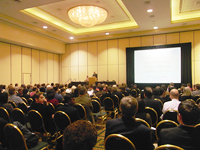経済統合とサステイナビリティ
人材育成:支援スキーム:調査研究支援スキーム(学生)
Jeet Bahadur Sapkota / 調査地域: Philadelphia, USA
2010.04.09
Year: 2009-10 (D2)
Name: Jeet Bahadur SAPKOTA
Itinerary: 03/23/2010 - 03/30/2010(Month/Date/Year)
調査地域
リサーチ目的
Thus, major objective of this investigative research is to present the research paper, entitled "Globalization and Quality of Life (QOL) Convergence in Asia: Evidence from the KOF Index of Globalization" in the Annual Meeting 2010 of the Association for Asian Studies in Philadelphia.
研究課題
Main purposes of this research project are twofold: First, to find out QOL convergence (or divergence) in Asia. Second purpose is to assess the impact of globalization on the convergence (or divergence) process. To achieve these goals, globalization and QOL data of 19 Asian countries covering 1975 to 2005 in five years intervals are used. Applying the dynamic panel data mode, it is found that the QOL in the region is converging and globalization affects to this convergence process.
成果
The research project successfully met its objectives. The paper was presented in the "Annual Meeting 2010 of the Association for Asian Studies" at the Marriott Downtown Philadelphia, USA.
After the presentation there was a lively question and answer session. Many Professors and PhD students from various universities provided very useful and insightful comments and suggestions. Particularly, comments by the panel organizer Professor Mark E. Lincicome at the College of Holly Cross and Chair of the Council of Conferences of the AAS Professor Linda Walton at Portland State University were encouraging.
In addition, grand exhibition of major universities, research centres and publishing houses around the world was very much useful to collect information on current research focus and trends on Asian studies including Asian regional integration studies. Informal interactions in many receptions organized by the organizer and other institutions had been a great venue for sharing information and networking. On such occasions, I was able to disseminate GIARI's activities and information.
Finally, as this all became possible because of GIARI's generous financial support and valuable guidance to conduct this research project, I earnestly thank the GIARI and its considerate team.


